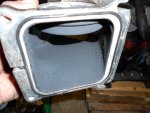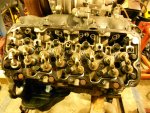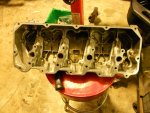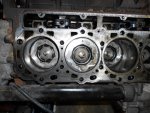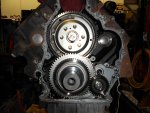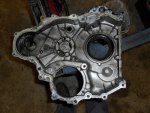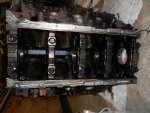That Dino oil (delo400) you speak of at 3k intervals in my motor looks 10x better that the inside of that motor and still running, so what's your point

How do you know its cleaner than this engine if its still together in one piece and never been opened..??....
For a everyday daily driver that hauled heavy trailers for almost a year straight and wasnt shut down for over 3 weeks due to subzero temps during some the runs. This engine is CLEAN. The builder/engineer that took the engine apart was happy to see it this clean. Now from someone who wrenches on circle track and drag motors that are torn down after 1 or 2 races to say an engine is clean after seeing how clean an engine is after 1 race.....Yeah...this engine is a mess

bearings looked pretty worn on the cam how'd the rest look... also amosil makes sludge all oil does that I've seen in my experience
the cam bearings were actually in good shape. no scores or thin areas. IIRC they measured just under GM install spec. And I mean like 0.0002" and we figured between differences in measure tools and basic wear; they are considered to be with in spec. The rod bearings had very good wear marks all around with no base layers showing thru any where. There were 2 pistons that had some flattening of the top of the bearing at the long section of the rod. One was the broken piston and the other was the one on the same journal. Al the main bearings were in excellent shape. no scores, wipe marks, or flattening. the thrust bearings had minimal wear on the front side and no wear back side.
The cylinder bores had excellent cross hatch markings and no deformations or ridging. The cylinders have gotten a quick hone on a Sunnen Machine; just to give the new rings something to bit into.
Yes, even a full synthetic oil can "make" sludge. The sludge is coming from the fuel being used and getting past the rings during normal operation. no engine any where in the world that does not have blow by. even rotary engines. the synthetic base product does not contribute to the sludge as does the base products of dino oil.
Any one that saw this motor coming apart during tear down was happy to see how clean it was. no sludge or goo in any corners of the lifter boxes or in the bottom of the oil pan.....even in the forward hump of the lower pan.
One thing that nobody looks at for a sludge contributor is the air filter and intake track. Cheap air filters and dirty air filters allow dirt to pas thru the intake and these particle can and will get past into the oil system.
Did the engine have a lot of cold starts; with a short run trip where the engine and oil did not get to operating temps. This is also a good contributor to sludge building up. The oil doesnt get hot enough to loosen the dirt and liquify the waxes and be able to wash then down into the filter and lower pan areas.
Engine oil has cloud points and cold flow points that it needs to met for a specific grade and application. Just like diesel fuel has these same points it needs to meet to operate correctly. So if an oil doesnt get to operating temps between starts and stops; sludge can and will be formed.
These pics and many others were sent off to the AMSOIL Corp. thru the owners up line dealers and the AMSOIL engineers were happy with everything they saw. They were excited to see that the cylinders were in "perfect" condition and the "lack of sludge and build up" with in may areas of the engine.


